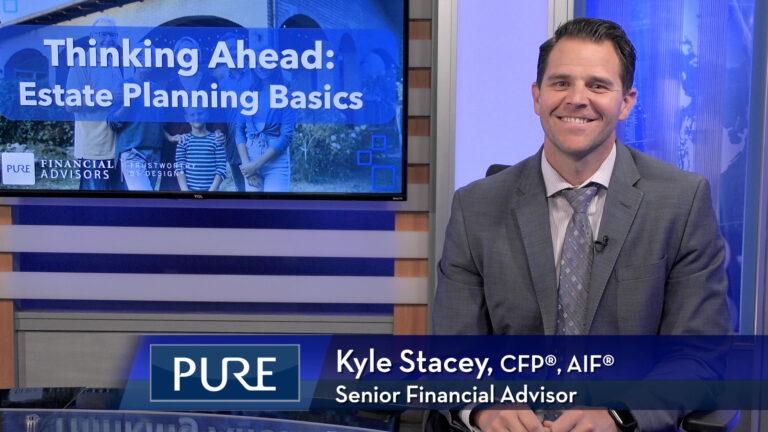As healthcare costs are anticipated to be a major part of retirement expenses for Americans, securing the right coverage to meet your specific needs is crucial. Pure’s Senior Financial Advisor, Joe Schweiger, CFP®, AIF®, describes the details of Medigap to help you navigate your available options.
FREE GUIDE | Medicare Checkup Guide

Transcript
According to the most recent cost estimate done by Fidelity Investments, a 65-year-old individual retiring today can expect to pay $165,000 on health care costs during their lifetime1. When it comes to insurance for most retirees, Medicare is going to be the primary source of coverage. Today, we’re going to discuss what Medigap insurance policies are, how they work, and how you can purchase one.
Medigap is a supplemental insurance policy sold by private companies that can be used along with Medicare Parts A and B to fill the “gaps” in coverage. To qualify for Medigap insurance, you must have Medicare Part A & B. You aren’t eligible if you have a Medicare Advantage Plan.
Medigap plans are designated by letters which range from A to N, and each plan has different benefits. As with any insurance, the costs will vary depending on which plan you choose to go with. In 2023, the average cost for a Medigap insurance policy was $155 a month, or $1,860 a year.
Medigap plans can help you cover costs related to deductibles, co-payments, coinsurance, and more. Some policies also offer benefits for medical expenses that arise when traveling abroad. Skilled nursing facility care after a hospital stay is a common cost Medigap policies will cover.
Medicare will allow for 100 days of skilled nursing care, but only will pay for 20 days. The Medigap policy can help cover the remaining 80 days in such a situation.
With retirement health care costs expected to be such a large part of Americans’ retirements, it’s crucial to get the appropriate level of coverage for your specific needs. Working with a qualified insurance professional can help you navigate the different options available. Additionally, the Medicare.Gov website has many resources available if you’re interested in purchasing a Medigap policy.
Essentially, purchasing a Medigap policy comes down to 3 steps: first, decide the plan you want. Second, pick you policy. Third, contact the insurance company and apply for coverage.
If you’d like to see how Medical insurance costs will impact your overall retirement plan, contact Pure for a free financial analysis.
Subscribe to our YouTube channel.
IMPORTANT DISCLOSURES:
• Investment Advisory and Financial Planning Services are offered through Pure Financial Advisors, LLC, a Registered Investment Advisor.
• Pure Financial Advisors LLC does not offer tax or legal advice. Consult with your tax advisor or attorney regarding specific situations.
• Opinions expressed are subject to change without notice and are not intended as investment advice or to predict future performance.
• Investing involves risk including the potential loss of principal. No investment strategy can guarantee a profit or protect against loss in periods of declining values.
• All information is believed to be from reliable sources; however, we make no representation as to its completeness or accuracy.
• Intended for educational purposes only and are not intended as individualized advice or a guarantee that you will achieve a desired result. Before implementing any strategies discussed you should consult your tax and financial advisors.
• Pure Financial Advisors, LLC, is not affiliated with any government agency, including, but not limited to Medicare.
CFP® – The CERTIFIED FINANCIAL PLANNER™ certification is by the Certified Financial Planner Board of Standards, Inc. To attain the right to use the CFP® designation, an individual must satisfactorily fulfill education, experience and ethics requirements as well as pass a comprehensive exam. Thirty hours of continuing education is required every two years to maintain the designation.
AIF® – Accredited Investment Fiduciary designation is administered by the Center for Fiduciary Studies fi360. To receive the AIF Designation, an individual must meet prerequisite criteria, complete a training program, and pass a comprehensive examination. Six hours of continuing education is required annually to maintain the designation.
Source:
-
Fidelity, “How to Plan for Rising Health Care Costs,” August 2024.













